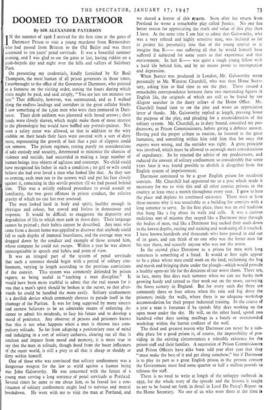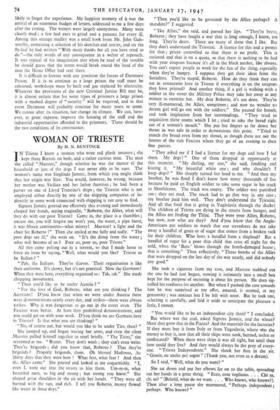DOOMED TO DARTMOOR
By SIR ALEXANDER PATERSON N the summer of 1906 I arrived for the first time at the gates of Dartmoor Prison to visit a young murderer from Bermondsey who had passed from Brixton to the Old Bailey and was there sentenced to ten years' penal servitude. It was a beautiful summer evening, and I was glad to see the gates at last, having ridden on a push-bicycle day and night over the hills and valleys of Salisbury Plain.
On presenting my credentials, kindly furnished by Sir Basil Thompson, the most human of all prison governors in those times, I wassbrought to the office of the Governor of Dartmoor, who pointed to a footnote on the visiting order, stating the hours during which visits might be paid, and said crisply, "You are just ten minutes too late." That difficulty, however, was surmounted, and as I walked along the endless landings and corridors in the great cellular blocks I saw something of the 1,50o men who were then immured in Dart- MOOT. Their drab uniform was plastered with broad arrows ; their heads were closely shaven, which might make them of more interest to the phrenologist but would have baffled any portrait-painter. Not even a safety razor was allowed, so that in addition to the wiry stubble on their heads their faces were covered with a sort of dirty moss, representing the growth of hair that a pair of clippers could not remove. The prison regimen, resting purely on considerations of safe custody and security, determined to minimise the chances of violence and suicide, had succeeded in making a large number of human beings into objects of ugliness and contempt. No child could have recognised his father in such a condition ; no girl or wife could believe she had ever loved a man who looked like that. As they saw us coming, each man ran to the nearest wall and put his face closely against it, remaining in this servile position till we had passed behind him. This was a strictly ordered procedure to avoid assault or familiarity, the two great offences in prison conduct, the relative gravity of which no one has ever assessed.
The men looked hard in body and spirit, healthy enough in physique and colour, but cowed and listless in demeanour and response. It would be difficult to exaggerate the depravity and degradation of life to which men sank in those days. Their language cannot be printed ; their habits cannot be described. Any man who came from a decent home was appalled to discover that anybody could fall to such depths of immoral beastliness, and the average man was dragged down by the conduct and example of those around him, whose company he could not escape. Within a year he was almost unrecognisable in speech and habits and point of view.
It was an integral part of the system of penal servitude that such a sentence should begin with a period of solitary con- finement, varying in length according to the previous convictions of the convict. This system was commonly defended by prison experts as being useful in "teaching a man discipline." It would have been more truthful to admit that the real reason for it was that a man's spirit should be broken at the outset, so that after- wards he could be handled the more easily. Solitary confinement is a devilish device which commonly chooses to parade itself in the plumage of the Puritan. It was for long supposed by many sincere and earnest believers to be an admirable means of enforcing Litt sinner to admit his misdeeds, to face his future and to develop a mood of penitence. Any observer of prisons and prisoners knows that this is not what happens when -a man is thrown into com- pulsory solitude. So far from adopting a penitentiary state of mind and indulging in a sort of solitary catharsis, clearing out all that is unclean and impure from mood and memory, it is more true to say that the man in solitude, though freed from the baser influences of the outer world, is still a prey to all that is cheap or shoddy or dirty within himself.
One of those who was convinced that solitary confinement was a dangerous weapon for the law to wield against a human being was John Galsworthy. He was concerned with the future of a young man serving a long sentence of penal servitude at Portland. Several times he came to me about hint, as he feared lest a con- tinuance of solitary confinement might lead to nervous and mental breakdown. He went with me to visit the man at Portland, and we shared a horror of this system. Soon after his return from Portland he wrote a remarkable play called Yustice. No one has better reason for appreciating the truth and value of this play than I have. At the same time I am fain to admit that Galsworthy, who was a very refined and highly sensitive marl, was inclined so far to project his personality into that of the young convict as to imagine that K— was suffering all that he would himself haw suffered if subjected for some years to that experience and that environment. In fact K— was quite a tough young fellow wiLh a hard life behind him, and by no means prone to introspection and depression.
When Yustice was produced in London, Mr. Galsworthy wrote personally to Mr. Winston Churchill, who was then Home Secre- tary, asking him to find time to see the play. There ensued a remarkable correspondence between these two outstanding figures in English life, the originals of which are still to be found by me diligent searcher in the dusty cellars of the Home Office. Mr.
Churchill found time to see the play and wrote an appreciative letter of thanks. Mr. Galsworthy replied at length, pressing home the purpose of the play, and pleading for a reconsideration of the solitary system. Mr. Churchill, as in duty bound, consulted my pre- decessors, as Prison Commissioners, before giving a definite answer.
Having paid the proper tribute to routine, he listened to the great humanist, and something within him told him that for once the experts were wrong, and the outsider was right. A great principle was involved, which must be allowed to outweigh mere considerations of expediency. So he rejected the advice of my predecessors, and reduced the amount of solitary confinement so considerably that some years later it was found possible to abolish it altogether from the English system of imprisonment.
Dartmoor continued to be a great English prison for recidivist convicts. Mr. Churchill had appointed me to a post which made it necessary for me to visit this and all other convict prisons in the country at least once a month throughout every year. I grew to hate the place and deplore its continued existence. There were at least three reasons why it was unsuitable as a building for convicts with a long sentence to serve. In the first place, there was an evil tradition that hung like a fog about its walls and cells. It was a curious malicious sort of miasma that seeped like a Dartmoor mist through the bodies of men, 3nd like a Dartmoor bog sucked their souls down to the lowest depths, rusting and staining and weakening all it touched.
I have known hundreds and thousands who have passed in and out of its gates, and can think of no one who was the better man for his stay there, and scarcely anyone who was not the worse.
In the second place Dartmoor as a prison for men with long sentences is something of a fraud. It would at first sight appear to be a place where men could work on the land, reclaiming the bog and marsh and bringing them under the plough—which would provide a healthy open-air life for the denizens of our worst slums. There are, in fact, many fine days each summer when we can see husky men growing hardy and tanned as they work out on the moor, surveying the finest scenery in England. But for every such day there are commonly three or four others when the rain and fog drive the prisoners inside the walls, where there is no adequate workshop accommodation for their proper industrial training. In the course of a year a man is fortunate if he spends fifty days working on the open moor under the sky. He will, on the other hand, spend two hundred ether days sewing mailbags in a lonely or overcrowded workshop within the barren confines of the wall.
The third and greatest reason why Dartmoor can never be a suit- able place for a good prison is, of course, the impossibility of pro-
viding in the existing circumstances a tolerable existence for the prison staff and their families. A succession of Prison Commissioners and Prison Officers have alike been told year after year that they "must make the best of it and get along somehow," but if Dartmoor is to play its part as a great English prison in the present century the Government must find some quarter or half a million pounds to rehouse the staff.
There is no need to write at length of the unhappy outbreak in 1932, for the whole story of the episode and the lessons it taught us are to be found set forth in detail in Lord Du Parcq's Report to the Home Secretary. No one of us who were there at the time is likely to forget the experience. My happiest memory of it was the arrival of an enormous budget of letters, addressed to me a few days after the rioting. The writers were largely anonymous. Many were clearly mad ; a few had axes to grind and a panacea for every ill. Among this strange medley was a small book from Mr. John Gals- worthy, containing a selection of his sketches and stories, and on the fly-leaf he had written "With many thanks for all you have tried to do "—the only words of any consequence in a welter of reproach. It was typical of his imagination that When he read of the trouble he should guess that the storm would break round the head of the man the Home Office had sent there.
It is difficult to foresee with any precision the future of Dartmoor Prison. If it is to continue as a large prison the staff must be rehoused, workshops must be built and gas replaced by electricity. Whatever the provisions of the new Criminal Justice Bill may be, it is almost certain that for seine types of prisoners a large prison with a marked degree of " security " will be required, and in that event Dartmoor will probably continue for many years to come. We cannot alter its situation, nor change its climate. We can, how- ever, at great expense, improve the housing of the staff and the industrial opportunities afforded to the prisoners. These should be the two conditions of its continuance.



































 Previous page
Previous page